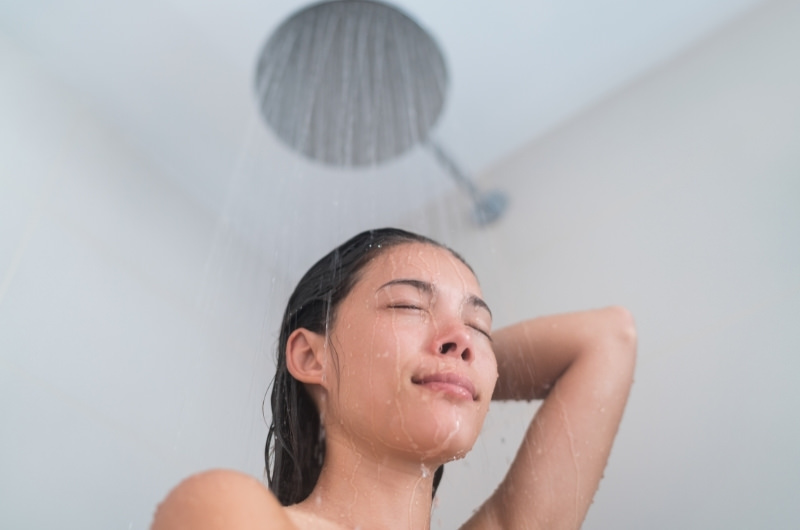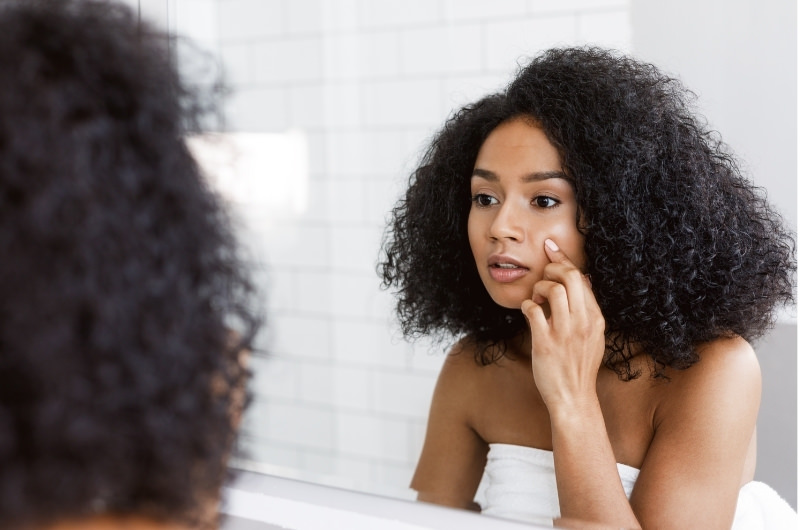Taking a bath not only cleanses your body and gives you that fresh feeling but also keeps your skin healthy. When you get out of the shower and notice your skin rubbing off, this could be a sign that it is renewing your dead skin cells. It’s normal since your skin needs new healthy cells to protect your entire system. Sometimes, you may notice the drying or flaking of your skin which could be a build-up of dead skin or an allergic reaction. You may soak yourself in a warm bath and gently scrub off these excess skin to speed up the growth of new skin cells. Reduce the usage of skin-care products and detergents with harsh chemicals to prevent dry skin and allergies.
I’ve always wondered what causes my skin to have that white flaky stuff every time I get out of the bath or after I do my laundry. It usually occurs on my palms, elbows, ankle, and sometimes, on my face.
I would rub it off and, it has this play dough-like texture. I had suspected that I got it from the bar soap that I use when taking a bath.
Since then, I switched to papaya and shea butter soap and use lots of lotion. Thank goodness, I never had that flaky skin issue again.
Reasons why your skin rubs off after you shower
1. Long and hot showers

If you love soaking yourself under a steamy shower for an hour, well, think again. It causes damage to the cells present on your skin.
Damaged cells won’t be able to lock in moisture. Thus, causing irritation, dryness, and peeling of your skin.
2. Too much scrubbing
Excessive scrubbing and using too many cleansing products may rub off natural oils from your skin and cause dryness. Dry skin usually peels/rubs off when you dry yourself in a towel.
3. Using harsh products
A lot of skin-care and cleaning products contain harsh chemicals which can irritate and dehydrate your skin. Your bar soap included.
Most bar soaps contain higher alkaline properties that disrupt the PH level of your skin. Thus, you may get dry or peeling skin as the adverse effects.
4. Not applying moisturizer
The moisture you get from taking bath strips away when you don’t use a moisturizer. It will leave you dry skin after you towel yourself.
5. Not scrubbing properly
It will leave you extra dead skin that still needs scrubbing off. As soon as you get out of the shower, you will notice it when you rub some parts of your body.
6. Growth of new skin cells (Desquamation)
The white and flaky pieces of stuff that appear on your skin after you shower could be a visible manifestation of a cell turnover or desquamation.
It is normal because the skin grows new healthy cells to replace dying and aging skin cells.
This process could only be visible, particularly in small sections of your body. Soaking yourself in a hot or warm bath will allow the skin to shed off dead skin cells. Thus, you may notice those white stuff when you get out of the shower.
7. Skin disorders
Below are some of the common skin diseases that show signs and symptoms of peeling off the skin;
- Exfoliative keratolysis – This happens when the skin on your palms or the soles of your feet peels off due to excessive sweating and friction or as an adverse reaction to detergents and solvents.
- Skin allergies or contact dermatitis – When your skin comes in contact with allergens in the environment or from the cleaning products you use, it could get you into an allergic reaction.
- Sunburn – It often gives you a painful and itchy feeling on your skin. After a few hours of sunburn, your skin will start to peel off, exposing the layer beneath it.
- Peeling Skin Syndrome (PSS) – It is a genetic and rare skin disorder. It is the gradual painless peeling of the outermost layer of the skin.
- Psoriasis – This condition often shows signs of red scaly patches on the skin and is painful when it starts to peel off.
Things you can do
You may already have an idea of what you should do about the rubbing/peeling off your skin after you shower.
If you think about it, it’s just the opposite of what’s listed above. Below are methods that will help you decrease dead skin build-ups and reduce its dryness and flakiness.
1. Bathe in lukewarm water
You may limit your time in the bath by doing 5-15 minutes in maximum.
Showering in lukewarm water will help you get enough moisture to your skin and boost the growth of new skin cells.
2. Use a natural body scrub
It will help you remove dead skin at the same time giving you that extra moisture. You may also use gentle cleansing products in washing your face for that hydrated and soothing feeling.
3. Switch to konjac sponge and soft silicone brush
Using a konjac sponge (for the body) and a silicone brush (for your face) will help you remove dead skin successfully.
Loofahs and washcloths easily get contaminated, especially when left wet in a humid space.
4. Apply moisturizer
You can apply lotion after you shower and dry. However, you may also want to do the in-shower moisturizing technique.
You have to apply moisturizer when the shower is still running. It will help you absorb and lock in the water giving your skin extra hydration.
5. Gently dry your skin
When you dry off with a towel, gently tap your skin instead of rubbing it to avoid too much friction that leads to dryness and irritation. It will also help your skin absorb water and moisture.
6. Don’t put on make-up
Let the peeling of your skin settle first, and do not try to cover it with make-up. Putting make-up will cause more dryness to your skin and interrupts the growth of your new skin cells.
7. Get enough sleep
Set a bedtime and follow that schedule. Turn off your phone or any gadgets at least 30 minutes or an hour before going to sleep.
Your skin regenerates new cells more quickly at night. So sleeping early at night will give you that radiant, young-looking, and healthy skin.
FAQs
How should I exfoliate my face?
You may exfoliate your face using tools like a brush, sponge, glove, and scrub or through exfoliating agents that contain AHAs and BHAs.
If you have dry skin, do not use tools to exfoliate your face. Instead, apply products that contain AHAs and/or glycolic acid to help you remove dry skin and hydrate your face.
If you have sensitive skin, heavy-duty exfoliating like using a brush or scrubs will irritate your skin. Instead, use a warm washcloth in applying a mild-exfoliating agent to your face.
If you have oily skin, you may use cleansing tools like a scrub or a Clarisonic and/or apply an exfoliating peel or serum.
For normal skin, you may use any exfoliating tools and agents. However, do them alternately to avoid irritation in your skin.
Remember to apply SPF-enriched moisturizers after exfoliating. Use lukewarm water to rinse your face and gently tap your face with a clean cloth to dry.
Conclusion
Your skin serves as the protective layer of your body. It needs delicate care because once it gets infected, your immune system will be at risk.
Your skin constantly generates new cells every few weeks to replace the dead cells on the uppermost part of your skin.
The dead skin comes off without you noticing. However, you may have to remove or exfoliate it to reduce build-up and prevent disruption in the growth of your new healthy cells.
Warm water often speeds up the regeneration of new skin cells. That’s why you get the peeling or rubbing off the thin layer of skin after a hot shower. It is relatively normal unless it is a sign of chronic skin disorders, which your dermatologists should tell you about.
Doctors will prescribe you medicines or even physical treatments to reduce pain and prevent further damage to your skin.


